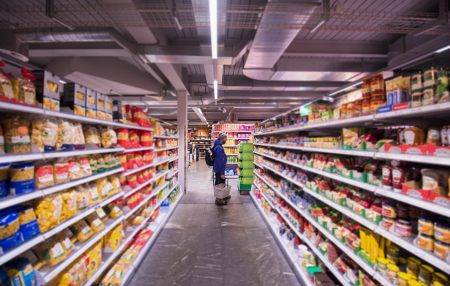
Here in the UK, the cost of living crisis has been an ever-salient news item for well over two years now, and for good reason. According to the Office for National Statistics, at its peak in 2022, prices of basic consumer goods and services rose at a faster rate than any other time since the 1980s. Naturally, this has seen many households across the country really feeling the pinch as individuals and families find themselves grappling with the rising prices of essential items and services.
So, the question is, when will the cost of living crisis end?
In this guide, we delve into the root causes of this crisis and predict when the UK’s economic situation may start to improve. We also provide our top tips for getting through the crisis, focusing specifically on what help is available for those struggling with the cost of living. This includes advice on government schemes and benefits, as well as the professional support that can be provided if you’re struggling with your finances.
Why is there a cost of living crisis?
Rather than being caused by a single issue, it’s more accurate to think of the current cost of living crisis happening as a result of a ‘perfect storm’ of various factors. This storm is made up of a rise in inflation in both the UK and the world in general, as well as the economic impact of issues such as the COVID-19 pandemic, Russia’s invasion of Ukraine, and Brexit. See our breakdown below:
- COVID-19
The aftermath of the COVID-19 pandemic has contributed to the cost of living crisis by not only causing global economic instability, but because it has led to a significant increase in demand for manufactured products, which has subsequently driven up the prices.
- Russia/Ukraine war
Although this has plateaued in recent months, during 2022, global energy costs surged due to the Russia-Ukraine conflict.
- Global warming
Food prices have increased steadily over the past few years due to global weather changes.
- Brexit
The impact of Brexit is thought to have added to the average UK household’s food bill. According to a recent London School of Economics study, Brexit could be responsible for an additional £250 on an average household’s food bill between December 2019 and March 2023.
- Stagflation
Stagflation occurs when a high inflation rate combines with high unemployment and stagnant wage growth. This combination means people are forced to pay more for goods without a corresponding increase in income, creating a situation where living becomes unaffordable.
When will the cost of living crisis end in the UK?
Put simply, there is no definitive way of knowing when the cost of living crisis will end. With so many variables in play, experts disagree as to whether there is light at the end of the tunnel or we are in this for the long haul.
Some experts have suggested that with the recent drop in inflation rates and a fall in the price of gas and oil on the global stage, the cost of living could well start to come down in the second half of 2024. That being said, others argue that the current cost of living is now a ‘new normal’ that is unlikely to come down any time soon. Those who hold this point of view argue that only significant growth in average household income will see an end to the crisis this decade.
Is the cost of living crisis worse in the UK?
Since 2021, the cost of living crisis has very much been a global phenomenon, with almost every nation on earth impacted to a certain degree. However, it’s fair to say that the UK has been hit particularly badly.
The UK’s inflation rate reached a high average of 9.1% in 2022, and this was one of the highest rates in Europe. When combined with the sharp rise in energy, food, and housing costs experienced in the UK since 2021, as well as a stagnation in incomes, the perfect storm of the cost of living crisis has hit the UK hard.
What help can I get with the cost of living?
Fortunately, there are various avenues of support available for those struggling with the cost of living. If you’re finding it hard to manage your finances through the cost of living crisis, it’s important to seek help. In the UK, help is available in a number of different shapes and sizes, and ranges from governmental support to professional financial assistance. We take a look at some of the support available below:
Governmental support
If you’re struggling to manage your finances as a result of the cost of living crisis, your first steps should be to check if you’re eligible for government support. There are a range of support packages currently available. These include:
- Cost of living payment: If you claim certain benefits, you could be eligible for a one-time £300 payment from the government to help with the cost of living. To check eligibility details, visit the government’s Help for Households website.
- Council tax reduction: If your household income falls below a certain threshold, you might be eligible for council tax reduction. To check, contact your local council.
- Warm home discount scheme: If you’re living on a low income, you could receive a £150 discount on your electricity bill through this scheme. Contact your energy supplier or check the Government website for eligibility criteria.
Debt management solutions
If the cost of living has forced you into unmanageable debt, a debt management solution may be the best tool to help you. Although there are a range of different solutions to fit different financial circumstances, two of the most common solutions are Debt Management Plans (DMPs) and Individual Voluntary Arrangements (IVAs).
DMPs are designed to help you manage all of your debts through one affordable monthly payment. By putting one of these plans in place, this can also reduce the amount of pressure your creditors put on you and offer ongoing support.
If your debts are over a certain level, an IVA could be a better solution. These formal, legally-binding agreements with your creditors allow you to repay a portion of your debt over a set period. Providing you stick to the terms of your agreement, any remaining debt after this period is written off.
If you’re struggling with the cost of living, it’s important to remember that you’re not alone. The resources mentioned above – as well as organisations such as Citizens Advice, National Debtline and StepChange – are all available to help you take back control of your finances.

To discover more about how to manage your debt and to receive free debt advice, you can visit www.moneyhelper.org.uk.
Alternatively, get in touch with us today. Here at MoneyPlus, we can provide all the information and advice you need to decide which solutions might work for you.

